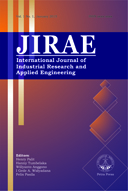Usage of Miniature Houses Built using Construction Materials in Engineering Educational Corporate Social Responsibility (CSR) Programs
DOI:
https://doi.org/10.9744/jirae.5.2.41-48Keywords:
Corporate social responsibility (CSR), education, engineer, miniature houseAbstract
The demand for engineers in Indonesia has not been met with the number of professional engineers working in their respective fields. This is partly due to the low interest in engineering among students. Therefore, various programs are implemented by the government and companies to be able to introduce, educate and change perceptions on the field of engineering. This research was conducted to propose a Corporate Social Responsibility (CSR) program in order to meet these objectives. The proposed program is an educational program in the form of a workshop on residential construction using miniature houses built of real construction materials as demonstration and learning tools. The program is aimed at high school students in accordance with the goal of increasing public interests and the number of potential engineers, particularly in the field of civil engineering. The validation process of the proposed program is done by distributing questionnaires to construction companies and high school students as stakeholders in the program's execution. The validation results show that the proposed program is quite attractive to construction companies and high school students, including those who are not interested in the engineering field. The program is also deemed feasible and able to meet the goal of developing students' interest in engineeringDownloads
Published
Issue
Section
License
Authors who publish with this journal agree to the following terms:
- Authors retain the copyright and publishing right, and grant the journal right of first publication with the work simultaneously licensed under a Creative Commons Attribution License that allows others to share the work with an acknowledgement of the work's authorship and initial publication in this journal.
- Authors are able to enter into separate, additional contractual arrangements for the non-exclusive distribution of the journal's published version of the work (e.g., post it to an institutional repository or publish it in a book), with an acknowledgement of its initial publication in this journal.
- Authors are permitted and encouraged to post their work online (e.g., in institutional repositories or on their website) followingthe publication of the article, as it can lead to productive exchanges, as well as earlier and greater citation of published work (See The Effect of Open Access).












